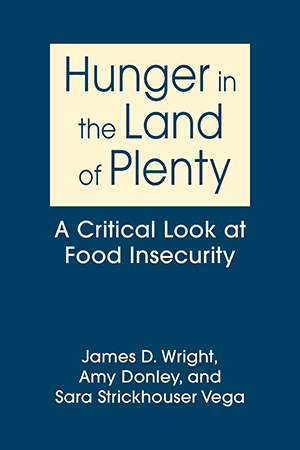James D. Wright, Amy Donley, and Sara Strickhouser Vega
In the United States today, 50 million people don't have enough food. How is this possible in one of the world's wealthiest countries? Why hasn’t the problem been solved? Is it simply an economic issue? Challenging conventional wisdom, the authors of Hunger in the Land of Plenty explore the causes and consequences of food insecurity; assess some of the major policies and programs that have been designed to reduce it; and consider alternative paths forward.
James D. Wright was Provost's Distinguished Research Professor Emeritus and Pegasus Professor Emeritus in the Department of Sociology at the University of Central Florida. Amy Donley is associate professor of sociology at the University of Central Florida. Sara Strickhouser is president of Summit Survey Research.
"An insightful discourse on food insecurity, including its social and historical context, risk factors, health consequences, current community strategies and policies, and future solutions." —Kaipeng Wang, Journal of Sociology & Social Welfare
"The authors ... do a powerful job arguing their essential case: that food insecurity is a problem of access and distribution more than it is a supply problem. [They] present a convincing case as to why policy makers and citizens should believe, and act, as if this is a solvable social problem." —Choice
"A far-reaching and important conversation on food insecurity that raises a number of critical questions—not just about the issue itself, but about the assumptions we make about it."—Stephen J. Scanlan, Ohio University
"Reorients the default thinking on food insecurity and food policy in the United States, providing a new lens on a very old problem."—Michael D. Gillespie, Eastern Illinois University








